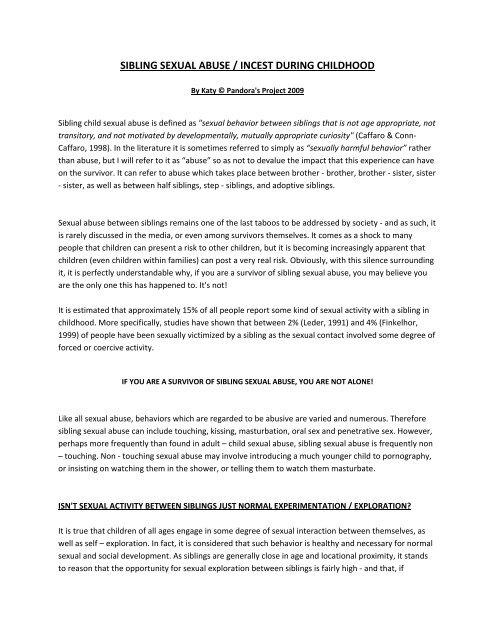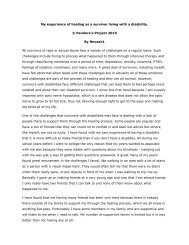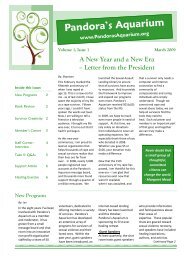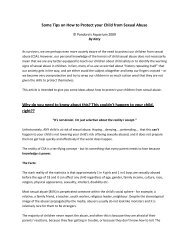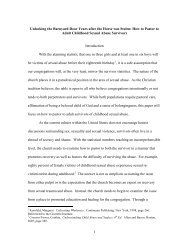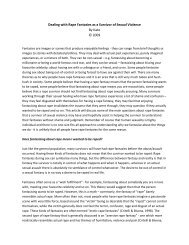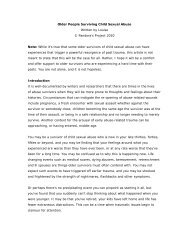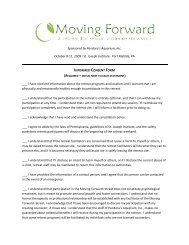SIBLING SEXUAL ABUSE / INCEST DURING CHILDHOOD
SIBLING SEXUAL ABUSE / INCEST DURING CHILDHOOD
SIBLING SEXUAL ABUSE / INCEST DURING CHILDHOOD
You also want an ePaper? Increase the reach of your titles
YUMPU automatically turns print PDFs into web optimized ePapers that Google loves.
<strong>SIBLING</strong> <strong>SEXUAL</strong> <strong>ABUSE</strong> / <strong>INCEST</strong> <strong>DURING</strong> <strong>CHILDHOOD</strong><br />
By Katy © Pandora's Project 2009<br />
Sibling child sexual abuse is defined as "sexual behavior between siblings that is not age appropriate, not<br />
transitory, and not motivated by developmentally, mutually appropriate curiosity" (Caffaro & Conn-<br />
Caffaro, 1998). In the literature it is sometimes referred to simply as “sexually harmful behavior” rather<br />
than abuse, but I will refer to it as “abuse” so as not to devalue the impact that this experience can have<br />
on the survivor. It can refer to abuse which takes place between brother - brother, brother - sister, sister<br />
- sister, as well as between half siblings, step - siblings, and adoptive siblings.<br />
Sexual abuse between siblings remains one of the last taboos to be addressed by society - and as such, it<br />
is rarely discussed in the media, or even among survivors themselves. It comes as a shock to many<br />
people that children can present a risk to other children, but it is becoming increasingly apparent that<br />
children (even children within families) can post a very real risk. Obviously, with this silence surrounding<br />
it, it is perfectly understandable why, if you are a survivor of sibling sexual abuse, you may believe you<br />
are the only one this has happened to. It's not!<br />
It is estimated that approximately 15% of all people report some kind of sexual activity with a sibling in<br />
childhood. More specifically, studies have shown that between 2% (Leder, 1991) and 4% (Finkelhor,<br />
1999) of people have been sexually victimized by a sibling as the sexual contact involved some degree of<br />
forced or coercive activity.<br />
IF YOU ARE A SURVIVOR OF <strong>SIBLING</strong> <strong>SEXUAL</strong> <strong>ABUSE</strong>, YOU ARE NOT ALONE!<br />
Like all sexual abuse, behaviors which are regarded to be abusive are varied and numerous. Therefore<br />
sibling sexual abuse can include touching, kissing, masturbation, oral sex and penetrative sex. However,<br />
perhaps more frequently than found in adult – child sexual abuse, sibling sexual abuse is frequently non<br />
– touching. Non - touching sexual abuse may involve introducing a much younger child to pornography,<br />
or insisting on watching them in the shower, or telling them to watch them masturbate.<br />
ISN'T <strong>SEXUAL</strong> ACTIVITY BETWEEN <strong>SIBLING</strong>S JUST NORMAL EXPERIMENTATION / EXPLORATION?<br />
It is true that children of all ages engage in some degree of sexual interaction between themselves, as<br />
well as self – exploration. In fact, it is considered that such behavior is healthy and necessary for normal<br />
sexual and social development. As siblings are generally close in age and locational proximity, it stands<br />
to reason that the opportunity for sexual exploration between siblings is fairly high - and that, if
appropriate and based on mutual curiosity, then these activities are not deemed to be harmful or<br />
distressing, either in childhood or later in adulthood (Borgis, 2002). For the sexual exploration to be<br />
deemed "appropriate" then the interaction is between children of a similar developmental age, where<br />
prior knowledge and experience, and physical and emotional development are on a par with each other.<br />
However, the line is crossed from sexual exploration to sexual abuse when sexual activity occurs<br />
between siblings where there is a significant difference in developmental age (more than 3 years), or<br />
where there is any use of force, tricks or coercion by one of the siblings.<br />
Therefore, if you had sexual contact with a much older sibling, OR if you were forced, tricked, or coerced into it,<br />
then you are a survivor of sibling sexual abuse.<br />
WHY DIDN'T I TELL AS A CHILD?! WHY IS IT STILL SO HARD TO TELL SOMEONE?<br />
The majority of survivors of childhood sexual abuse do not tell as children, or at least do not tell at the<br />
time the abuse is ongoing. The reasons for this are numerous, and it may help to see the following<br />
article: Understanding Why You Didn't Tell.<br />
It is very easy to look back as an adult and think of all the missed opportunities for when we could have<br />
broken the silence, or dismiss all of the reasons we felt we couldn't tell as unimportant. But it's<br />
important to remember that you are going to have a very different perspective about what your sibling<br />
did to you when looking back at it from your adult perspective, than you would have had when you were<br />
a confused and abused child.<br />
"It’s like it’s a wall – don’t talk about it. You can talk about this, this and this but don’t talk about that" (a<br />
survivor)<br />
When sexual abuse is perpetrated by a sibling, in many ways, it is even harder to break this silence, and<br />
there are certainly some special reasons that make sibling abuse especially difficult to disclose:<br />
• I didn't understand what was happening was "abuse"<br />
:Often, sibling abuse can start off seeming fun and exciting.....messing around with your brother / sister<br />
in a way that seems playful. As a child, we often don't have the cognitive ability to understand that<br />
something which may feel nice or thrilling can be wrong. Often, sibling abuse is more coercive than<br />
physically forceful i.e. you may have been gently persuaded that it would be fun; or you may have been<br />
bribed with sweets; and so even as adults, survivors are unclear as to whether what happened was<br />
abusive or not. A younger siblings cooperation does not suggest that they understood the nature of the<br />
sexual interaction.
• I thought it was just what siblings did:<br />
For some children, especially if the abuse has been on-going since they were very young, they can<br />
believe that this sexual interaction is just what happens between siblings. From childhood, we are<br />
usually told that, as siblings, we are supposed to love each other - and especially where we are not clear<br />
what "love" involves, it may have felt that this was part of that special sibling bond. Therefore, it may<br />
have been that it was only as you got older and learned about other people's sibling relationships, and<br />
about the different kinds of love, that the questioning begins.<br />
• I wanted it:<br />
Many survivors of sibling sexual abuse look back and feel a great deal of guilt about the fact that they<br />
welcomed the sexual contact. Statistics show that sibling sexual abuse is more likely (although not<br />
exclusively!) in emotionally dysfunctional families who are reluctant to show love or have overt displays<br />
of affection. It is generally accepted that children have four psychological needs, namely love and<br />
belonging, power, freedom and fun (Glasser 1998), and so especially in situations where the abuse was<br />
carried out by an older sibling in a way which felt nurturing, you may have welcomed or even sought out<br />
the sexual contact as it was the only type of close physical contact that you had from a family member -<br />
and it made you feel loved, wanted, and accepted (Laviola, 1992). This may have made you feel like a coconspirator<br />
and you may have believed that what you were doing was wrong, and disclosure would have<br />
resulted in punishment from your parents.<br />
The fact that you may have welcomed the sexual contact from your older sibling does not make you<br />
culpable. Children need affection - and will accept affection from wherever and however it is offered if it<br />
is not offered in the traditionally appropriate ways.<br />
• I enjoyed it:<br />
Like many survivors of child abuse, children may get physical pleasure from the abuse - including sexual<br />
arousal and orgasm. When a sibling is responsible for this arousal, the shame can feel enormous. Incest -<br />
particularly sexual arousal during incest - is still very much taboo in western society - and associated<br />
shame may even stop adult survivors of sibling sexual abuse from getting help. Please see: Sexual<br />
arousal and sexual assault.<br />
• I didn't want my sibling to get into trouble:<br />
Despite the sexual abuse, even when forced sexual assault takes place, children can feel a sense of<br />
loyalty towards their abusive sibling and not want them to get into trouble. You may still love your<br />
sibling, despite what pain they have caused you, and reporting them can feel very disloyal. You may<br />
have feared that your sibling would have been ejected from the family home, or sent to prison, or even
killed - and therefore silence felt like the only option.<br />
As an adult survivor, you may still have fears over disclosing the abuse because of sibling loyalty. In<br />
particular if your family was dysfunctional or unhappy, you may now be able to look back and even<br />
understand what led your sibling to abuse. Please try to appreciate that it is okay to love your sibling,<br />
but still want them to take responsibility for the hurt they have caused you, and for them to get<br />
treatment for themselves.<br />
• I didn't want to upset my parents:<br />
Many children of sibling abuse will not report it because they believe that the knowledge will devastate<br />
their parents. Therefore, the children stay silent in order to protect their parents - and again this can<br />
carry on into adulthood. Furthermore, there may be the belief that this truth would be too hard for their<br />
parents to bear, and so they would not believe the disclosure.<br />
• I was just too scared of my brother / sister:<br />
Some sibling sexual abuse is enforced by threat and / or physical violence. Because the sibling is a family<br />
member and likely to be living in the same house, the opportunity to carry out threats, and to reinforce<br />
these threats on a daily basis, is very real.<br />
• I was told it was a "family matter":<br />
: There is an assumption that things that happen within families are private....that they are "family<br />
matters", and as such, should not be discussed outside the family. Undoubtedly, this would have<br />
implications for any children seeking to disclose sibling abuse to a person outside the family (i.e. a<br />
teacher) because - again - family disloyalty may be an issue.<br />
• I just didn't / don't want anyone to know that my sibling is doing / did this to me:<br />
While childhood sexual abuse is now widely talked about in our society, sexual abuse by siblings is still<br />
very much a taboo subject. As such, survivors feel a great deal of shame which perpetuates the need for<br />
silence.<br />
**"To speak the truth is a painful thing. To be forced to tell lies is much worse" (Oscar Wilde)**
WHAT ARE THE EFFECTS OF <strong>CHILDHOOD</strong> <strong>SIBLING</strong> <strong>ABUSE</strong> ON SURVIVORS NOW IN THEIR TEENS AND<br />
ADULTHOOD?<br />
For many years, it was ascertained that sibling sexual abuse was harmless and didn't cause any<br />
significant detrimental effects on adult functioning, health, or relationships. In fact, what can make<br />
sibling sexual abuse particularly traumatising for survivors is the two concurrent views that sibling incest<br />
is both a cultural taboo and at the same time not harmful. Leading child mental health experts not<br />
refute the claim that sibling sexual abuse is unharmful (Russell, 1986).<br />
Following any type of child sexual abuse, adult survivors can experience:<br />
Somatic disturbances: Insomnia, nightmares, night terrors.<br />
Parenthood problems: Worrying what effect childhood abuse may have on a their relationship with<br />
children. Please see: Pregnancy, childbirth, parenting as a suvivor.<br />
Poor self-concept / self-esteem.<br />
Revictimization.<br />
Self Blame / Shame / guilt.<br />
Sexual dysfunction.<br />
Relationship problems: issues with trust and intimacy.<br />
Psychiatric ill-health: PTSD, self-injury, eating disorders, suicide, DID.<br />
Physical ill health: i.e. STD's, substance abuse.<br />
Research has heralded that sibling relationships are extremely important for a child's development, and<br />
thus it makes sense that sibling sexual abuse could have a profound and major impact upon its victims<br />
(Jones, 2002). Whilst the above effects are common to many survivors of childhood sexual abuse, there<br />
are certain areas that are particularly worthy of further discussion when focusing of sibling sexual abuse:<br />
The situation: Siblings often spend a great deal of time together, perhaps more than any other family<br />
relationship, as they may not only be together when in the family arena, but they may also share a<br />
bedroom, school, friends, clubs, toys etc. Therefore, where sibling abuse is occurring, the sense of<br />
powerlessness and lack of control over their lives, can feel even more pervasive and invasive when<br />
compared to sexual abuse perpetrated by others (Maddock et al, 1995). This can lead to learned<br />
helplessness, which for the adult survivor can result in revictimization, clinical depression, extreme<br />
anxiety disorders etc.<br />
Intimate relationships / sexuality: Sibling relationships in childhood can have a major impact upon the<br />
development of later relationships, and ultimately many survivors will have difficulty forming and<br />
maintaining intimate adult relationships (Daie et al, 1989), and infact almost half never marry (Russellis,<br />
1986; Alpert, 1991). However, this is largely attributed to the stalling of development (Caffaro, 1988),<br />
and therefore with support and therapy, survivors can learn to develop socially, sexually and<br />
emotionally - and form healthy attachments.
Survivors of sibling sexual abuse may have a very poor sexual self-concept, and because of the taboo<br />
nature of sibling incest, you may even view yourself as a "sexual deviant" - which can undoubtedly have<br />
an impact upon sexual development (Finkelhor, 1980). This was NOT your fault, and the guilt is not<br />
yours to own.<br />
Pregnancy: Pregnancy rates are said to be higher in sibling abuse, often because the opportunity for acts<br />
of rape to occur are higher than with other types of child abuse. In this situation, not only does the child<br />
have to deal with the issue of pregnancy by itself, but also the added complications that result in regards<br />
to the genetic risks to the infant. Full siblings are 50% genetically identical and 99.95% biochemically<br />
identical, and therefore there is a far greater risk of sharing the same recessive genes which, when<br />
combined, can result in severe medical abnormality.<br />
However, there is also some evidence that female victims of sibling sexual abuse who become pregnant<br />
are less likely to abort the pregnancy, either because they see the pregnancy through as they see it as a<br />
way of exposing or terminating the incestuous relationship, and because they are less likely to feel hate<br />
for their abuser. (Maloof, 1999). Consequently, the adult survivor may have to care for a child where<br />
they know the father is their brother, and the increased likelihood that this child will have a genetic<br />
medical condition.<br />
The adult relationship with sibling and family: Although some adult survivors of child sibling abuse may<br />
report a primarily neutral relationship with their sibling (Hardy, 2001), others may experience extreme<br />
difficulties with this relationship, which can be problematic for the family as a whole (particularly if the<br />
abuse is undisclosed). Family occasions and functions may be particularly traumatic for you because you<br />
may feel a loyalty to attend the family function, yet feel very uncomfortable around your sibling.<br />
One particular problem of sibling abuse, particularly where the abuse has been nurturance – orientated,<br />
is that as the child turns into an adult, they may have particular difficulty in separating from the abuser<br />
(Cicirelli, 1995) as a kind of dependence and attachment as formed. Particularly when it comes to<br />
forming romantic relationships with others, this attachment can feel very strong, and some have<br />
reported feeling like they are being disloyal or even cheating on their abusing sibling when they are<br />
attracted to someone else (Meiselman, 1978).<br />
You may also feel a great deal of resentment towards your family as you were not afforded adequate<br />
protection - and you may even feel a need for revenge (Johnson, 1989). You are very entitled to your<br />
anger, and you may need help in learning to express this in a safe and appropriate way.<br />
The most important thing at this time is your safety and your perceived safety, and it may be that you<br />
need to withdraw somewhat from your family at times rather than put yourself through the pain of<br />
confronting your abuser. YOU need to some first.
WHY?<br />
It is not in the scope of this article to look in any details why a child may abuse their sibling(s) as the<br />
reasons are complex and the focus is on the survivor. However, in sibling abuse, the question “WHY?” is<br />
often asked even more frequently – because of the backgrounds you share. Family dynamics, previous<br />
history and power differentials clearly have an important role to play in what makes a sibling sexually<br />
abusive towards another sibling. Some sibling survivors spend a long time trying to understand why? -<br />
and that’s a legitimate question - but its not a necessary one for healing to take place. The most<br />
important thing to realise is that none of what happened is your fault.<br />
BOOKS<br />
RESOURCES FOR SURVIVORS OF <strong>SIBLING</strong> <strong>SEXUAL</strong> <strong>ABUSE</strong> AND THEIR<br />
SUPPORTERS<br />
Understanding Your Child’s Sexual Behavior, By Toni Cavanaugh Johnson<br />
Sex Is More Than a Plumbing Lesson: A Parents' Guide to Sexuality Education for Infants Through the<br />
Teen Years by Patty Stark<br />
From Diapers to Dating: A Parents Guide to Raising Sexually Healthy Children, By Debra Haffner<br />
A Very Touching Book: For Little People and Big People, By Jan Hindman<br />
Sibling Abuse: Hidden Physical, Emotional and Sexual Abuse<br />
When Children Molest Children: Group Treatment Strategies for Young Sexual Abusers. By Cunningham,<br />
Carolyn and Kee MacFarlane.<br />
The Sibling Bond. By Stephen Bank.<br />
The Broken Taboo. By Blair & Rita Justice Harper.<br />
Uncovering Shame. By James and M. Hoopes<br />
Sibling relationships across the life span. By. V.C. Cicirelli.<br />
What Parents Need to Know About Sibling Abuse: Breaking the Cycle of Violence. by Vernon R. Wiehe<br />
Secret Survivors: Uncovering Incest and Its Aftereffects in Women by E. Sue Blume<br />
Allies in Healing. By Laura Davies.<br />
A Walk In The Woods: An Incest Survivor's Guide to Resolving the Past and Creating a Great Future. Nan<br />
O'Connor<br />
Heal & Forgive: Forgiveness in the Face of Abuse. by Nancy Richards<br />
OTHER READING<br />
Myths about incest.<br />
SASIAN - Sibling Violence & Abuse<br />
Thread on child-on-child sexual abuse (at Pandys)
Thread on sibling incest / abuse (at Pandys)<br />
Pandy's articles on child sexual abuse.<br />
This article is copyrighted and unauthorized reproduction is prohibited. If you wish to use<br />
this article online or in print, please contact admin[a]pandys.org to request permission. Visit<br />
www.PandorasProject.org for more information and articles.


